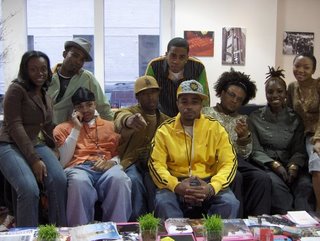Tribeca 3 -- Music

The Tribeca Film Festival has not just exploded past
its original geographic boundaries, but past its
original subject matter focus as well. In addition to
screenings of over 170 films and hundreds of
film-related events -- press conferences, receptions
for female and documentary film-makers, workshops,
demonstrations of new technologies, special one-on-one
sessions for first-time film-makers to get guidance
from the pros, and panel discussions with performers,
producers, and directors – there is an outdoor fair
for families, and there are scene readings featuring Matthew
Broderick and Judd Hirsh and art shows at a local
gallery.
Music in particular seems especially important this
year. Screenings include documentaries about
established and emerging music groups and the festival
will have live performances featuring Elvis Costello
and Allen Toussaint, John Mayer, and the Brazilian
Girls.
Musician/composer/soundtrack artist T. Bone Burnett
was interviewed by Vanity Fair’s Lisa Robinson before
a packed auditorium in a wide-ranging discussion
punctuated with clips from some of his films,
including “The Big Lebowski,” “Cold Mountain,” and “O
Brother Where Art Thou.”
Burnett talked about how he listens to music (loud and
on vinyl, and if anyone talks he turns it off) and the
way that “Music is not notes for me any more. It's
all booms and clumps and bumps and dings.
Onomatopoeia.” He talked about the original recording
of “I Walk the Line:” “Sam Phillips gave Johnny Cash
a dollar bill to stick under his guitar strings to
muffle the sound, turning his guitar into a snare
drum, just the heart beat of the song.” Burnett
coached non-singers Joaquin Phoenix and Reese
Witherspoon for their portrayals of Johnny Cash and
June Carter Cash.
Robinson asked how his relationship with the Coen
brothers began. “I went to see ‘Raising Arizona’ and
it hit me that these people had been paying attention
to all the things I had been paying attention to and
for the first time in my life I just called someone
up.” They told him they had a movie that, unlike what
they had done before, would have songs from artists,
not just a soundtrack, and they invited him to work
with them. It was The Big Lebowski.
“We had the Gypsy Kings do the Eagles song, ‘Hotel California.’ That's exactly the kind of misdirection with music that the Coens do visually.” He wanted to have Townes van Zandt perform the Rolling Stones song, “Dead Flowers.” Alan Klein, who manages the rights to the Stones songs, refused – until they showed him some scenes and he heard The Dude say the line, "I hate the Eagles." “So then he said, ‘All right, you can have it.’”
His new project is “Across the Universe,” inspired by the songs of the Beatles, directed by Julie Taymor of Broadway’s “The Lion King.”
One of the emerging musical groups features in a
Tribeca films this year is “Word.Life: The Hip Hop
Project,” a documentary produced by Bruce Willis about
a program that teaches at-risk teenagers to tell their
stories through hip-hop. Chris “Kazi” Rolle, who
founded the program when he was a homeless teenager,
told me that he was inspired by “Hoop Dreams.” “A lot
of inner city kids see sports as their way out.”
Rolle wanted to give them a chance with something they
could do themselves, without relying on anyone outside
the community. So he adopted what he calls “the pill
in the dog food” approach, “pulling them in with what
they like,” hip-hop. His goal is to reach “the kid in
the back of the class – he is always scribbling
something.” When they arrive, they want to imitate
what they have heard. “Young people live from the
outside in; TV and radio tell them who they have to
be.” But he brings them back to the origins of
hip-hop – “it started as political” and encourages
them to tell their own stories by listening to them
and encouraging them to listen to each other.




1 comment:
Cool! I loved the bit about Johnny Cash and the dollar under the strings of his guitar.
Post a Comment